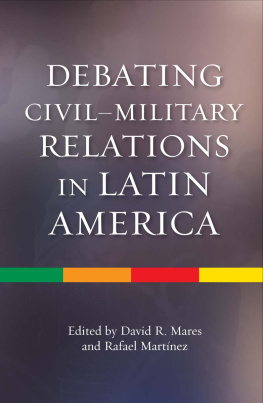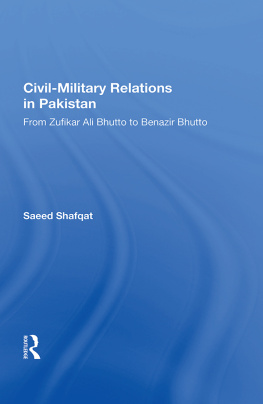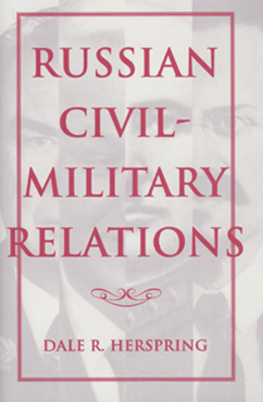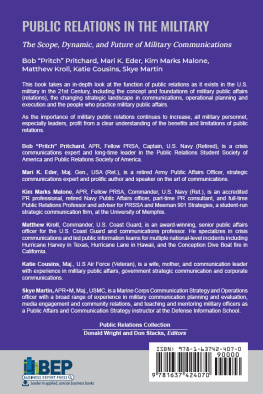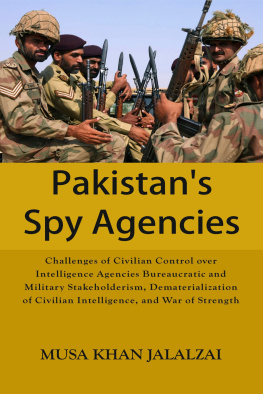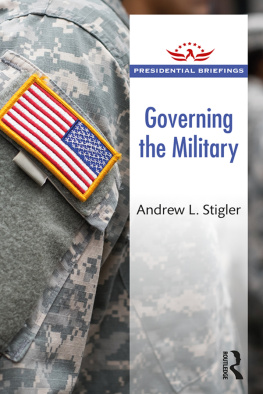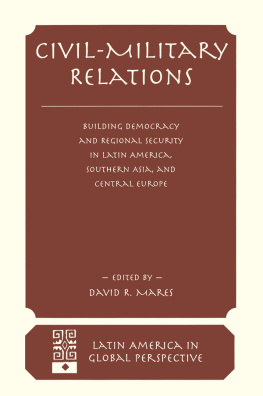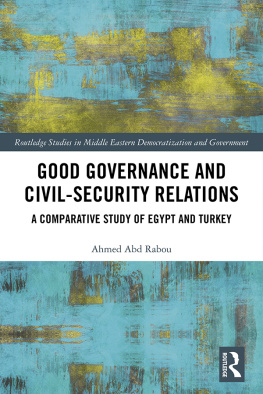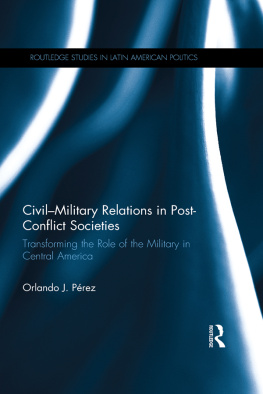The study of civilmilitary relations in Latin America produced a rich debate and research agenda prior to 2000. But this agenda was largely abandoned during the past decade as the specter of military dictatorship has virtually disappeared, with the political role of the military in many countries dramatically diminished. Indeed, in no country that has initiated a process of holding the military accountable to civilian control has the military openly rebelled. Yet, the institutions and public attitudes that guarantee democratic civilian control of the military exist in a general context of political polarization, citizen insecurity and in many countries a sense of developing ungovernability. The military coup in Honduras (2009), the military response to the police rebellion in Ecuador (2010), and the speculation concerning the Venezuelan militarys behavior now that Hugo Chavez has passed away, demonstrate the relevance and importance of the civilmilitary relationship today.
In this volume leading scholars from Latin America, the U.S. and Spain debate the ability of contemporary Latin American civilmilitary relationships to weather these challenges. The authors examine new types of regimes (the rise of participatory democracy), new political orientations (the renaissance of the Left in Latin America), and new missions for the military. Debate centers on the indicators to evaluate the level of consolidation of civilian control, the manner in which these indicators are measured, and the empirical ambiguities that arise. These challenges must be confronted in order to effectively address the question of how much progress has been made in the region in subordinating the military to civilian control, which countries are lagging behind, and why.
The Editors
David R. Mares is Institute of the Americas Chair for Inter-American Affairs and Director of the Center for Iberian and Latin American Studies at the University of California, San Diego. Rafael Martnez is Professor of Political Science, Universitat de Barcelona and 2003 recipient of the Spanish Defense Ministry National Prize for Peace, Security and Defense Research.
Sussex Library of Study
The Latin America Series
S OCIETY , P OLITICS, AND C ULTURE
The Latin American Series seeks to establish itself as a venue for the publication of high-quality monographs and edited volumes on Latin American societies, their economies, polities, and cultures. The series is refereed by distinguished scholars in the field. Its editor is Prof. Carlos H. Waisman, Department of Sociology and International Studies Program, University of California, San Diego. Within this series, the Latin American Library, published with the sponsorship of CILAS, the Center for Iberian and Latin American Studies at the University of California, San Diego, is a vehicle for the dissemination of research carried out at that institution.

Introduction and Editorial Organization of this volume, copyright David R. Mares and Rafael Martnez, 2014. All other chapters copyright Sussex Academic Press, 2014.
The right of David R. Mares and Rafael Martnez to be identified as Editors of this work has been asserted in accordance with the Copyright, Designs and Patents Act 1988. The right of Nick Rider to be identified as translator of the chapters by Narcs Serra, Rafael Martnez, Rut Diamint and Alejo Vargas Velsquez, and the Martnez contribution to the Introduction, has been likewise asserted.
Published in the Sussex Academic e-Library, 2014.
SUSSEX ACADEMIC PRESS
PO Box 139
Eastbourne BN24 9BP, UK
and simultaneously in the United States of America and Canada
Published with the sponsorship of CILAS, the Center for Iberian and Latin American Studies at the University of California, San Diego.
All rights reserved. Except for the quotation of short passages for the purposes of criticism and review, no part of this publication may be reproduced, stored in a retrieval system or transmitted in any form or by any means, electronic, mechanical, photocopying, recording or otherwise, without the prior permission of the publisher.
British Library Cataloguing in Publication Data
A CIP catalogue record for this book is available from the British Library.
Library of Congress Cataloging-in-Publication Data
Debating civilmilitary relations in Latin America / edited by David R. Mares and Rafael Martnez
pages cm
Includes bibliographical references and index.
ISBN 978-1-84519-591-5 (h/b)
ISBN 978-1-78284-121-0 (e-pub)
ISBN 978-1-78284-122-7 (e-mobi)
ISBN 978-1-78284-123-4 (e-pdf)
1. Civilmilitary relationsLatin America. 2. DemocracyLatin America. 3. DemocratizationLatin America. 4. Latin AmericaPolitics and government1948 I. Mares, David R. JL956.C58D44 2014
322.5098dc23
2013023560
This e-book text has been prepared for electronic viewing. Some features, including tables and figures, might not display as in the print version, due to electronic conversion limitations and/or copyright strictures.
Prologue
Narcs Serra
Chairman of the Board of CIDOB
The subject of civilmilitary relations has been the focus of an abundant literature ever since the seminal works of Samuel Huntington and Morris Janowitz, published more than half a century ago, and advocating opposing policies. While Huntington called for the armed forces to be preserved from the liberal and anti-military evolution of American society if their effectiveness was to be guaranteed, Janowitz foresaw the evolution of armed forces towards international policing missions and proposed a substantial integration of civil and military capacities as the best means of guaranteeing the militarys efficacy.
The decade of the 1990s was perhaps the most prolific in the production of studies on this topic, following two major lines of research and argument. The first, centered on the United States, analyzed the question of control of the armed forces in a consolidated democracy, following certain difficulties encountered by President Bill Clinton in his relationship with the armed forces. Russell F. Weigley, the historian who coined the concept of an American Way of War, and Richard H. Kohn initiated this debate with their reactions to the position taken by Colin Powell in opposing military intervention in Bosnia. Many other academics have enriched it, among whom Peter Feaver and Eliot A. Cohen stand out.
However, it is in the area opened up by the second line of debate in which we should locate the present volume, that which studies the question of control of the military during processes of transition to democracy. In this field, too, particular events foreshadowed the discussion. These were the three transitions in Southern Europe during the 1970s, the wave of subsequent democratization processes in Latin America, and the processes initiated in Eastern Europe following perestroika in the Soviet Union.
At the time when this book is to be published, the popular revolts that have come to be known as the Arab Spring have set into relief in another part of the world the transcendental importance of the attitude of the armed forces in processes of transition to democracy, and the need to find policies that place them in a position subordinate to the new democratic authorities.

